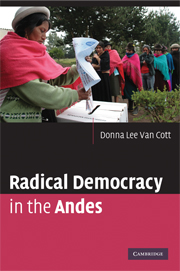Book contents
- Frontmatter
- Contents
- Acknowledgments
- List of Acronyms
- 1 Introduction: The Political and Cultural Origins of Democratic Institutional Innovation
- 2 The Legal and Political Context for Municipal Reform in Bolivia and Ecuador
- 3 Mayoral Leadership and Democratic Institutional Innovation
- 4 Political Parties, Civil Society, and Democratic Institutional Innovation
- 5 Institutional Innovation in Ecuador
- 6 Institutional Innovation in Bolivia
- 7 Conclusion: An Interaction Model of Democratic Institutional Innovation
- References
- Index
2 - The Legal and Political Context for Municipal Reform in Bolivia and Ecuador
Published online by Cambridge University Press: 05 September 2012
- Frontmatter
- Contents
- Acknowledgments
- List of Acronyms
- 1 Introduction: The Political and Cultural Origins of Democratic Institutional Innovation
- 2 The Legal and Political Context for Municipal Reform in Bolivia and Ecuador
- 3 Mayoral Leadership and Democratic Institutional Innovation
- 4 Political Parties, Civil Society, and Democratic Institutional Innovation
- 5 Institutional Innovation in Ecuador
- 6 Institutional Innovation in Bolivia
- 7 Conclusion: An Interaction Model of Democratic Institutional Innovation
- References
- Index
Summary
Decentralization and democratization in Bolivia and Ecuador occurred in the context of regional and global trends that shifted powers from central to local governments and expanded citizen participation in public decision making. These trends converged with the return to civilian-elected rule in Latin America in the late 1970s and accelerated and deepened over the next decade. Latin America in subsequent decades produced some of the most admired decentralization experiences (Eaton 2004: 36). Development professionals embraced the writings of political theorists extolling the “normative, substantive and instrumental benefits of participation” (Humphreys et al. 2006: 585–6). By the 1990s virtually all major development players – multilateral and bilateral donors and civil society groups – had embraced a preference for governance methods that facilitate the autonomous involvement of stakeholders in the choice, design, implementation, and monitoring of development programs. Thus, when Andean indigenous governments sought new ways to link social-movement organizations with public decision-making bodies in the 1990s, they received enthusiastic support from many development actors.
Before we investigate the variations in institutional innovation in particular municipalities, it is important to understand the enormous impact of the larger legal, political, and economic contexts in each country. We must remember that the most important decisions that affect local living conditions are made in distant national, and even international, capitols (Bebbington 2005: 5; Grindle 2007: 182–3). In the first section I describe the development of decentralization in Ecuador and Bolivia.
- Type
- Chapter
- Information
- Radical Democracy in the Andes , pp. 34 - 57Publisher: Cambridge University PressPrint publication year: 2008



